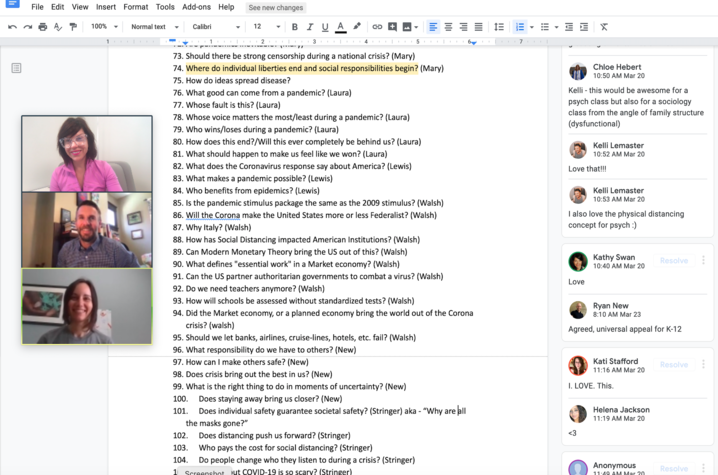UK Education Professors Encourage Students' Critical Thinking During COVID-19

LEXINGTON, Ky. (May 12, 2020) — While the story of the coronavirus (COVID-19) pandemic will be told in history books, there are millions of students living through this historic turning point. University of Kentucky College of Education professor Kathy Swan wants to help enable today’s students to build critical thinking and problem-solving skills by asking compelling questions around an event that is shaping the world in which they live.
Swan, along with colleagues Ryan Crowley and Laura Darolia, worked last week with UK College of Education graduate students to develop a resource to inspire K-12 social studies teachers to continue engaging students in questions.
“As our state and nation began to take measures to slow the spread of the virus, fears and questions were mounting,” Swan said. “Like us, we knew our students were independently asking important and deeply relevant questions about our past, our world and the uncertainty that lies ahead. It seemed right to collaboratively channel those questions into a larger conversation.”
Swan sent an email to the social studies teachers working on master’s and doctoral degrees in her program at UK. She initially saw an opportunity to pause as a social studies community and think about the ways in which the pandemic was shaping our civic lives.
“Inquiry is a fundamental part of being human and asking questions is the right and responsibility of every citizen,” she wrote to the students. She shared with them some of the questions that came to her mind, such as:
What is the balance between freedom and security?
Will a virus heal the partisan divide?
How will disease change the world?
“Inquiry is at the heart of teaching social studies,” Swan said. “By asking students to ponder a compelling question, we hope it triggers curiosity and sets them up to think deeply as they investigate and share their answers.”
As Swan’s graduate students began to respond to her email, she saw an opportunity to have the students contribute questions about the pandemic that could be organized and shared with the 15,000 social studies teachers on Swan’s website, C3teachers.org. She and fellow writers John Lee (N.C. State) and S.G. Grant (Binghamton University) created the website to empower teachers as they wrestle with the big ideas and instructional implications of the national social studies teaching standards.
“I didn’t provide a lot of creative direction, but I reminded the students to make sure they pressure tested the questions in their head to ensure they were written in a way that would set up students to make an evidentiary argument,” Swan said. “Now more than ever, we want students to read the news but be able to differentiate arguments from opinions. We want our students to ask important questions but to answer them by using credible sources of information. Questions should set students up to do that.”
Swan is a leader in social studies teaching and curriculum development, most notably as the lead author of the national standards that guide how social studies is taught, called the College, Career, and Civic Life (C3) Framework for Social Studies State Standards. She has co-authored seven books on the Inquiry Design Model, that provide guidance for teachers on how to create intellectually engaging and thoughtful inquiry experiences for students. Graduate students studying with Swan have contributed to the inquiry examples on C3teachers.org and helped work on curricular projects with organizations like the Smithsonian American Indian Museum, the Southern Poverty Law Center and the Council for Economic Education.
The final list of questions was organized into disciplines that make up Dimension 2 of the C3 Framework. “While no question is purely civic, economic, geographic, or historical, they were sorted into those categories because students’ exploration of the topics would likely fall under one of those disciplines,” Swan said. The questions were posted online this week and Swan hopes teachers will use them as a resource or inspire them to keep asking their own questions.
“We are all living in uncertain times and deliberative thought is as important as ever,” Swan said. “The efforts of the graduate students to compile questions around the pandemic helps us remember the importance of questions and the ways in which questions move us forward. My hope was that if we could channel their uncertainty into questions, it might be a bit cathartic. It turned out to be much more than that.”
To learn more about becoming a social studies teacher, contact the UK College of Education Department of Curriculum and Instruction.
As the state’s flagship, land-grant institution, the University of Kentucky exists to advance the Commonwealth. We do that by preparing the next generation of leaders — placing students at the heart of everything we do — and transforming the lives of Kentuckians through education, research and creative work, service and health care. We pride ourselves on being a catalyst for breakthroughs and a force for healing, a place where ingenuity unfolds. It's all made possible by our people — visionaries, disruptors and pioneers — who make up 200 academic programs, a $476.5 million research and development enterprise and a world-class medical center, all on one campus.




